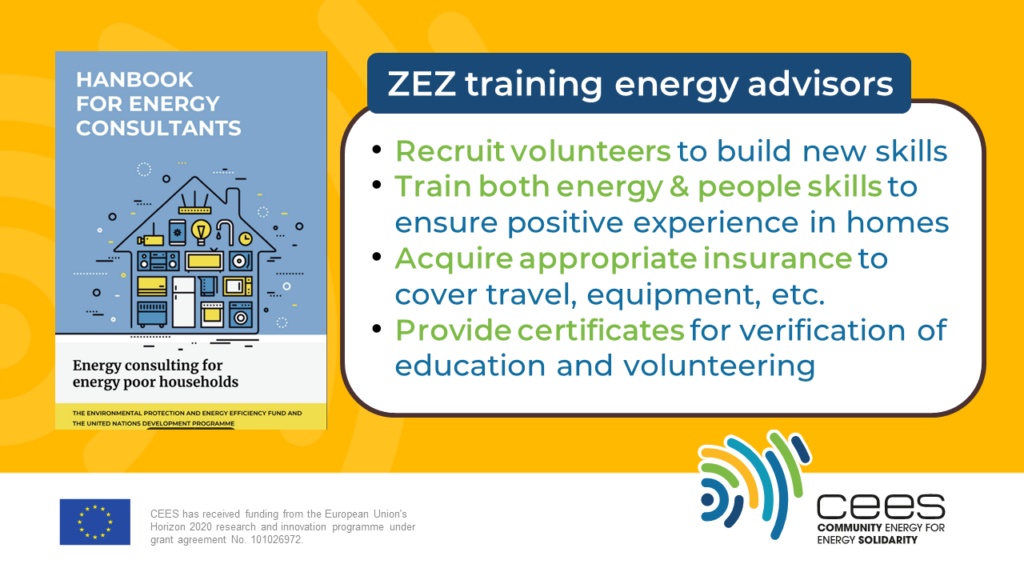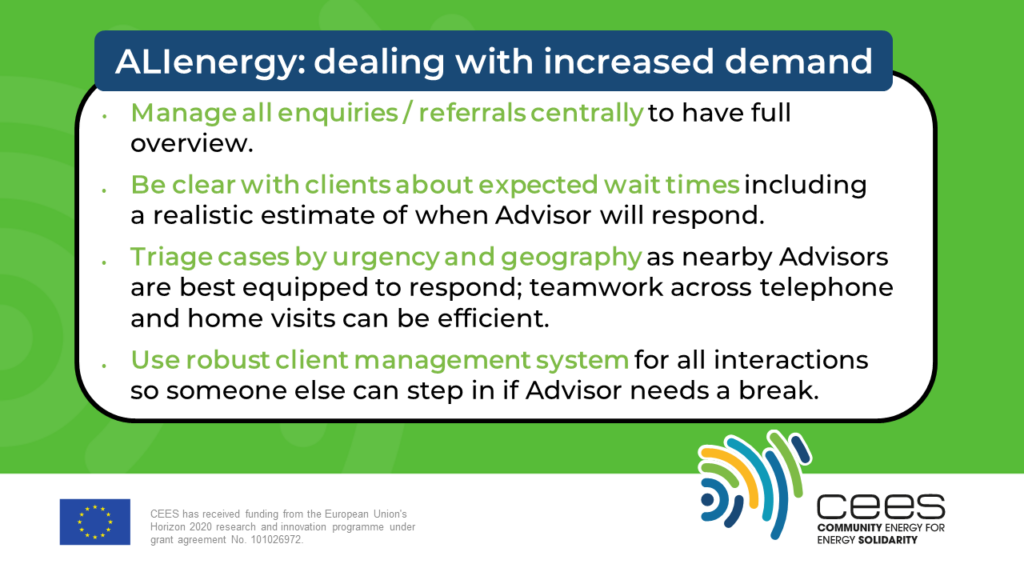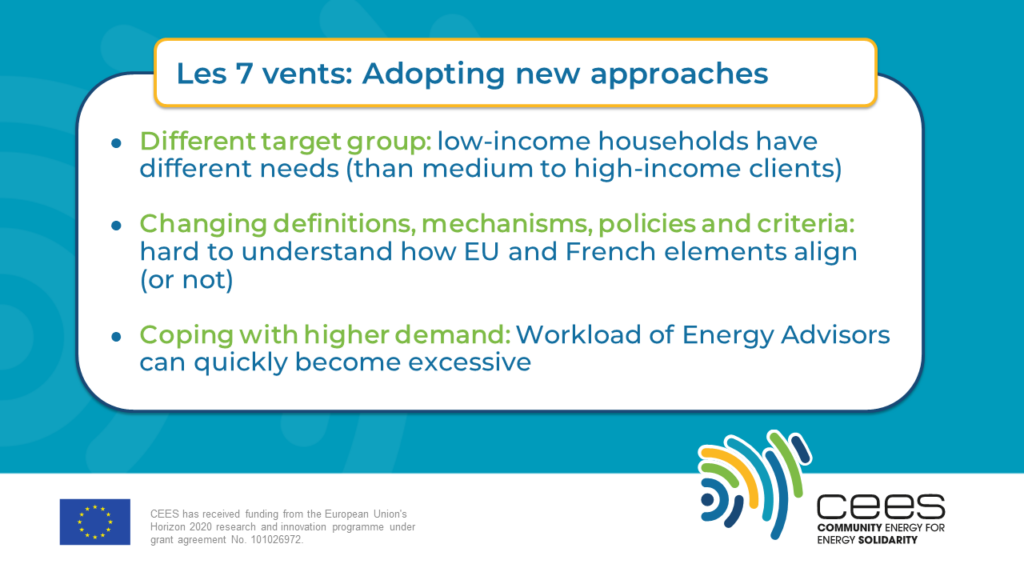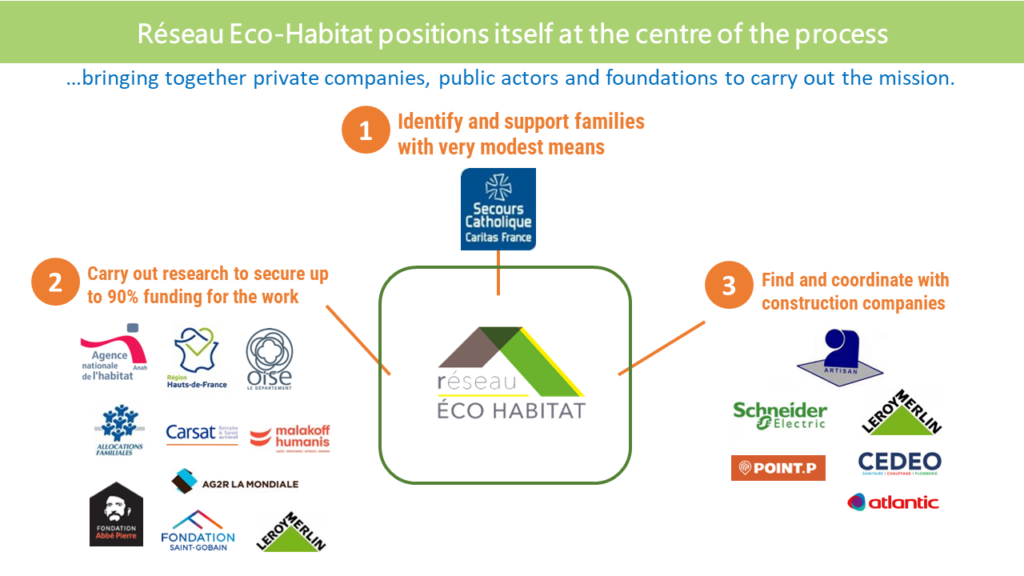Ultimately, energy solidarity is about taking steps to improve the situation of people in energy poverty. In this webinar, three CEES Partners discuss diverse actions and things to consider when entering people’s homes. Réseau Eco-Habitat (France) wraps up with insights about doing deep energy renovations.
Recent EU directives, including the recent Recommendation on Energy Poverty, either encourage or oblige Member States to prioritise vulnerable households in their strategies to achieve a just, clean energy transition. Notably, the Buildings Performance Directive.
As energy communities (ECs), CEES Partners ‘act’ primarily by supplying clean energy and carrying out ‘soft measures’. Typically, this involves efforts such as delivering cozy kits to help people feel warmer and installing devices that reduce energy consumption and bills. Ultimately, all recognise that most homes need extensive works (‘hard measures’) including better insulation, improved windows and more efficient heating systems.
In this third webinar (of four), the importance of applying both approaches comes to the fore. As hard measures are deeply disruptive and take many months to execute, soft measures can build trust and ease the burden of high energy bills in the short term.
Keep reading for a short recap or use the link to watch the full webinar. The time at which each presentation starts is indicated as [XX:XX].
CEES Partners featured
ZEZ (Green Energy Cooperative) [05:48]
After a successful crowdfunding campaign to package 250 cozy kits, ZEZ quickly realised the time involved in delivering them was beyond the capacity of the current staff. Turning a problem into an opportunity, ZEZ launched a campaign to recruit unemployed young people seeking to gain skills and experience. Training covered energy policy in Croatia, energy efficiency, and a step-by-step guide for household visits, including how to collect data needed for the CEES Project. ECs planning to implement soft measures – and to work with volunteers – need to seriously consider many implications, says Paula Damaska. Building social skills is critical, as volunteers may encounter people in very difficult situations. In turn, ZEZ emphasised the need to provide appropriate support to volunteers who may feel somewhat traumatised after many such encounters.

ALIenergy [19:19]
Working in the north and western areas of Scotland, where homes are old, weather is cold and incomes are low, ALIenergy is no stranger to high levels of energy poverty. For 20+ years, they have been delivering soft measures through both telephone advice and home visits. The ‘1-2-punch’ of COVID-19 and Russia’s invasion of Ukraine, however, forced ALIenergy to re-think how it could best serve rapidly rising demand for help. Ultimately, this meant thinking across all levels of action. First, finding ways to manage client expectations has become vital, including providing realistic timelines for a response to initial requests. In turn, front-line staff, both at ALIenergy and the organisations they partner with, needed additional training to carry out telephone assessments that would help ‘triage’ where needs are most urgent. Finally, monitoring the well-being of Energy Advisors has become even more important. With more households now facing dire situations, many Advisors face both intense time pressures and more emotional distress.

Les 7 vents [31:00]
For more than 20 years, Les 7 Vents has been active in both energy production and housing renovations in La Manche region of France (Normandy), with a strong focus on cooperative structures. For the most part, the organisation has worked with middle to high-income households that have the financial means to invest in improving the energy efficiency of their homes. Still, to keep costs down, a large portion of the works are carried out through a ‘3-SR’ approach: supported, shared, self-renovation. This means the work is led by a certified professional with members of the community volunteering to carry out manual labour aspects. Within the CEES Project, Les 7 Vents had to re-consider how they work to better meet the needs of vulnerable citizens. As with other CEES Partners, this involved re-training Energy Advisors to better understand both definitions and signs of energy poverty. A particular challenge that arose is actually good news! At both EU and French national levels, new policies have been introduced to provide subsidies and strategies for prioritising the worst homes. (In French, they are referred to as ‘passoires thermiques’, suggesting cold draughts pass through the way water goes through a strainer.) Keeping up with policy changes, however, is not easy and some are not well-adapted to local circumstances. Through CEES, Les 7 Vents has become more integrated with other local entities, particularly social assistance agencies, that have shared goals.

Invited Presenters
Franck Billeau and Jaqueline, Réseau Eco-Habitat [58:23]
Réseau Eco-Habitat (REH), like les 7 vents, is active in rural France, where poor-quality homes and low incomes drive many families into energy precarity. As founder Franck Billeau explains, some 25% of requests for financial aid to Secours Catholiques (a charitable organisation) were for help to pay energy bills. At the same time, Franck was aware that a large share of state aid for energy renovations for low-income households was going unused. He set out to: a) solve the root problem of excessive energy demand in old homes; and b) resolve the disconnect between need and available aid. REH now works closely with families in a holistic way. Often, by tapping into all subsidies for which a family is eligible, it can finance 85-90% of the costs of a deep energy renovation.
But two challenges remain. First, it is virtually impossible for most people to undertake alone the heavy work of applying for multiple subsidies. Second, it is very difficult for them to understand the bureaucratic language of governments and the technical language of renovators. To address this, REH serves as a facilitator, mediator, and translator among all parties involved. Very quickly, Franck realised that the journey is long: from first meeting to completing renovations is typically 18-24 months. Also, as he puts it, “People believe more in buying a lottery ticket on Friday, the 13th than that the government will do anything to help them.” To gain people’s trust and provide reassurance during the entire process, REH continues to work closely with volunteers from Secours Catholique. As Jacqueline attests, renovating a home often has the effect of restoring the dignity of its residents, delivering substantial economic and social benefits to individuals and communities.

Click below for summaries of other webinars in this series:
- No 1: Connecting with vulnerable households
- No 2: Connecting with ‘middle actors’ to tackle energy poverty
- No 4: Creating an ecosystem for sustained action
Interested in re-posting these webinars to reach your own networks? Drop us a line: marilyn.smith [@] energysolidarity.eu